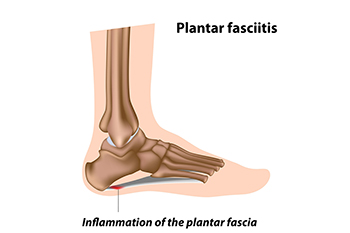
Unveiling the causes and risks of plantar fasciitis reveals an intricate network of tissues and ligaments that play a vital role in stabilizing your feet during movement. The main cause of plantar fasciitis lies in the excessive strain placed on the plantar fascia ligament on the sole of the foot, particularly at the point where it attaches to the heel. Engaging in high-impact sports or returning to activities too quickly after a break increases the risk of small tears around this attachment point, leading to inflammation. Occupations that require standing for extended periods of time can also contribute to the development of plantar fasciitis. Conditions like pronated feet, flat feet, or high arches create an uneven distribution of weight, putting added stress on the plantar fascia. Additionally, short calf muscles or a tight Achilles tendon constantly tug on the plantar fascia, increasing tension and vulnerability. Being overweight also places additional strain on the plantar fascia, heightening the likelihood of developing the condition. Additionally, age also contributes to the risk, as tissues become less elastic, and the fat pads under the heel tend to thin over time. For effective management of plantar fasciitis, it is suggested that you schedule an appointment with a chiropodist.
Plantar fasciitis can be painful and interfere with your daily activities. If you are experiencing foot or heel pain and believe you may be afflicted with plantar fasciitis, please consult with one of the chiropodists from Complete Family Footcare & Therapy. Our clinicians will assess your condition and provide you with quality foot and ankle treatment.
What Is Plantar Fasciitis?
Plantar fasciitis refers to the inflammation of the plantar fascia, a ligament that runs along the bottom of the foot and connects the heel bone to the toes. Repetitive activities, such as running or jumping, can injure the plantar fascia over time. Plantar fasciitis can also be caused by flat feet, high arches, pregnancy, and activities that put excessive pressure on your feet, like standing all day for work. When the plantar fascia becomes inflamed, it causes pain and discomfort.
Symptoms
Typical symptoms of plantar fasciitis include:
Stabbing pain near the heel
Pain that is worst in the morning or after a period of rest
Pain that increases after exercising
Swelling
Tightness in the Achilles tendon
Diagnosis
Plantar fasciitis is typically diagnosed via medical history and physical examination.
Treatment
Treatments for plantar fasciitis include resting and icing the affected foot, stretching the foot, taking medications to reduce inflammation, and wearing orthotics. In severe cases where pain does not improve with conservative treatments, injections or surgery may be recommended.
If you have any questions, please feel free to contact our offices located in . We offer the newest diagnostic and treatment technologies for all your foot care needs.
